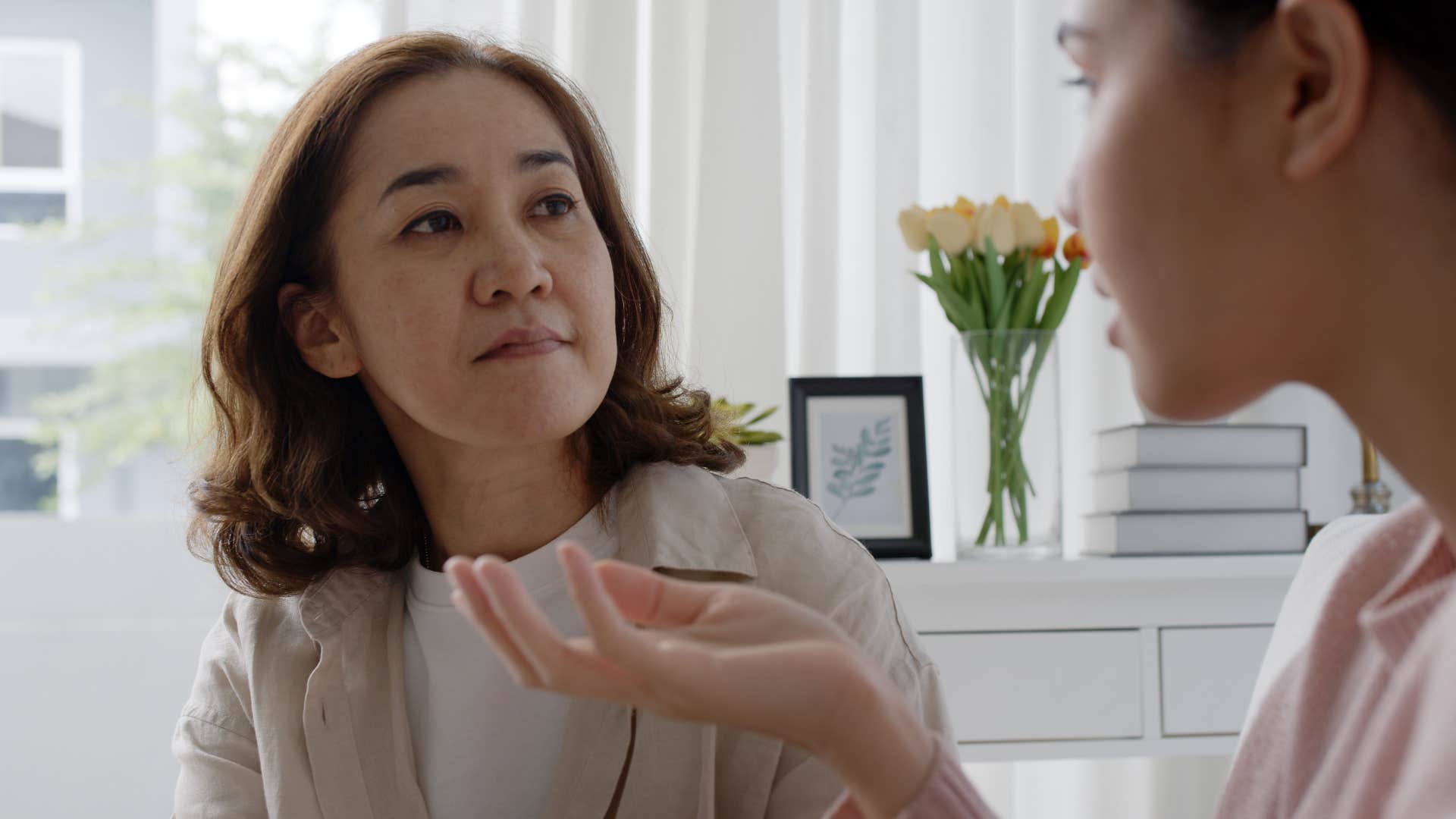11 Things Parents Do Without Realizing To Make Their Adult Kids Feel Like They're Failing
Even unintentionally mean phrases and behaviors can hurt someone's feelings.
 JJ-stockstudio | Shutterstock
JJ-stockstudio | Shutterstock With generational differences and an ever-changing societal context, it's not surprising that tensions between adult children and their parents are incredibly common, according to a study published in Psychology and Aging. Most of us know that open communication, trust, and unconditional love are the keys to maintaining a healthy relationship, but actually embodying and acting on them is much more difficult.
However, there are also a number of little things parents do without realizing to make their adult kids feel like they're failing. Even when they're well-intentioned, they can come across as dismissive and invalidating, pushing adult kids farther and farther away and exacerbating an already present divide.
Here are 11 things parents do without realizing to make their adult kids feel like they're failing
1. Comparing them to other people
 shurkin_son | Shutterstock
shurkin_son | Shutterstock
Comparison culture is everywhere — it's on social media, living subtly in our relationships, and even affecting the way we engage and communicate at work. Even when we're aware of it, we still feel drawn to feeding into it, comparing our bodies, appearances, clothing, and achievements with other people.
Psychotherapist Jane Bolton argues that comparing ourselves to others is often learned through societal constructs and expectations, but it can also be a side effect of our childhood experiences. If our parents constantly compared us with other people's kids or our siblings growing up, it's not uncommon for that same tendency to follow us into adulthood.
It's one of the things parents do without realizing to make their adult kids feel like they're failing, as well. They may bring up their friend's child who has a great job or just got married, compare their child's success to that of their friend's child at the same age, or even boast about a sibling's success and ask "Why aren't you doing the same?" Even when it's well-intentioned, it can still spark resentment and frustration.
2. Giving unsolicited advice
 Chay_Tee | Shutterstock
Chay_Tee | Shutterstock
Unsolicited advice is one of the common things parents do without realizing to make their adult kids feel like they're failing. When an adult child comes to their parents to vent or seek emotional support, the last thing they want to hear is a "solution" to get rid of the feelings and emotions they're experiencing. Instead, they just want to feel heard.
According to family therapist Sarah Epstein, this kind of advice can quickly sabotage a parent-child relationship in adulthood, pushing kids away from their parents, building resentment, and sparking disconnection.
3. Focusing on traditional paths to success
 Gladskikh Tatiana | Shutterstock
Gladskikh Tatiana | Shutterstock
Whether it's pushing a traditional university track or pressuring their adult kids to enter Corporate America, focusing on traditional life paths to success is one of the things parents do without realizing to make their adult kids feel like they're failing.
Despite sometimes struggling to take a step back and let their adult kids embrace independence, it's still possible to let them make their own choices and solve their own problems without pressuring them into "the right decision" or giving unsolicited advice.
Adult children have the means to make decisions in their best interest, even if they're not "traditional" or the same ones their parents made. If you're a parent, let your kids come to you when they want advice or guidance; don't offer it up or pressure them to make a certain choice when they haven't asked you for help.
4. Dismissing their struggles
 fizkes | Shutterstock
fizkes | Shutterstock
Considering many parents grew up in a much different environment than their adult kids today, it can feel like second nature to dismiss their struggles, even when they don't realize they're doing it.
With phrases like "back in my day" or "you don't even realize how easy you have it," parents invalidate their adult kids' struggles and dismiss their feelings by suggesting they're not working hard enough or enduring enough hardship to have the freedom to complain or vent.
Everyone just wants to feel heard, whether it's in their personal lives, in their family relationships, and even at work. Making an effort to listen, support other people's emotions, and avoid dismissive language can make all the difference in building a healthier and more meaningful relationship.
5. Trying to solve their problems
 pixelheadphoto digitalskillet | Shutterstock
pixelheadphoto digitalskillet | Shutterstock
While many adult children do come to their parents for advice, sometimes on a weekly basis, according to Pew Research Center, expecting parents to solve their problems isn't realistic. Oftentimes, seeking guidance or advice from their parents is an avenue to seek emotional support. They don't want to have their problems solved by their parents, they just want a safe space to vent.
Parents who struggle with the independence and natural separation of having an adult child may overstep boundaries and go too far trying to solve all of their kids' problems and struggles. Not only does this invalidate the independence and autonomy adult kids work so hard to uplift, it overlooks the importance of grounded, present, and engaged emotional support.
It's one of the things parents do without realizing it that makes their adult kids feel like they're failing. They're perfectly capable of handling their own issues, so why are their parents trying to overstep?
6. Making support transactional
 Amnaj Khetsamtip | Shutterstock
Amnaj Khetsamtip | Shutterstock
Whether it's financial support, doing something for their child, or providing emotional guidance, parents that expect something in return when they help their kids are only pushing them further away. Their adult kids want emotional support and unconditional love, but instead, they feel pressured to "work for it" or provide something before they're deserving of it.
Having a relationship with a transactional person isn't always easy to spot, but it can have detrimental effects on self-esteem. If an adult child is constantly having to work for affection or love from their parents, chances are they're going to carry those beliefs into other relationships at the expense of their self-esteem and feelings of self-worth.
7. Giving backhanded compliments
 fizkes | Shutterstock
fizkes | Shutterstock
Considering backhanded compliments are often tied to unrealistic societal expectations and standards, according to a paper from Harvard Business School, it's not surprising that they're one of the things that make adult kids feel like they're failing.
When they're given by their parents, who are supposed to be the most supportive and influential people in a child's life, they not only undermine their kids' well-being, they negatively impact self-esteem and self-worth.
They can be subtle, which is why intentionality with language and in conversations is so important — consider "How are you still single?" or "I'm surprised you did so well." They may seem kind-hearted and well-intentioned, but they don't evoke positive feelings.
8. Being distant
 Ground Picture | Shutterstock
Ground Picture | Shutterstock
While disconnection is natural for parents and adult kids as they start their own lives and embrace their new autonomy, constant distance can make kids feel like they're failing. For example, having a parent that never starts a conversation, reaches out, or celebrates your accomplishments genuinely can feel isolating, like you've done something wrong for simply living your life.
Setting boundaries and having conversations about the communication you need is important in every relationship, but especially for parents and adult children as they navigate this new stage in their lives.
9. Judging their lifestyle choices
 fizkes | Shutterstock
fizkes | Shutterstock
Especially coupled with generational tensions and disconnect, parents and their kids are never going to share the same values or beliefs on every topic. It's just not realistic, especially in the current state of the world where each is battling a unique set of different struggles and experiences.
However, it's possible to have conversations about differing beliefs and opinions without judging, criticizing, or attacking the other. By focusing on emotional support, rather than compromise or agreement, adult kids and their parents can find a neutral ground for open and positive discussion.
When parents judge their kids or dismiss their opinions, it only pushes them farther away and makes them feel like they're failing.
10. Constantly bringing up grandchildren
 ViDI Studio | Shutterstock
ViDI Studio | Shutterstock
Many adult children feel a pressure to "settle down" and have children later in life from their parents, which can dismiss and invalidate the struggles, experiences, and even successes they're living through right now.
Oftentimes, this pressure comes from a parent's discomfort with the natural disconnect that happens with their kids as they get older. They view grandchildren as a means to get closer with their kids, provide guidance, and see them more often.
Of course, this pressure is clearly not the right way to bridge the gap between parents and adult children, it's all about communication. It's okay to want grandchildren and even to express your excitement, but constantly bringing it up and overlooking the things going on in your child's life right now can make them feel like they're failing.
11. Downplaying mental health
 fizkes | Shutterstock
fizkes | Shutterstock
By criticizing an adult child's need for therapy or dismissing their mental health in conversations, parents can make their adult children feel like they're failing or not good enough, even without realizing they're doing it.
It's not entirely uncommon for conversations around mental health to cause divisiveness in families, considering different generations have embraced or shouldered the burden of stigma in unique ways. For example, baby boomers learned to suppress their emotions and to view mental health as "a choice" that could be overcome with perseverance or a strong-willed work ethic. Younger generations like Gen Z believe it's something you live with, should talk about openly, and even seek help for mitigating.
Of course, there's going to be a disconnect and inherent sense of resentment between boomer family members and Gen Z because of this misalignment of values. They have inherently different comfort levels when it comes to talking about mental health. However, that doesn't mean they can't support each other and have open conversations, it just takes empathy and trust.
Zayda Slabbekoorn is a staff writer with a bachelor's degree in social relations & policy and gender studies who focuses on psychology, relationships, self-help, and human interest stories.

